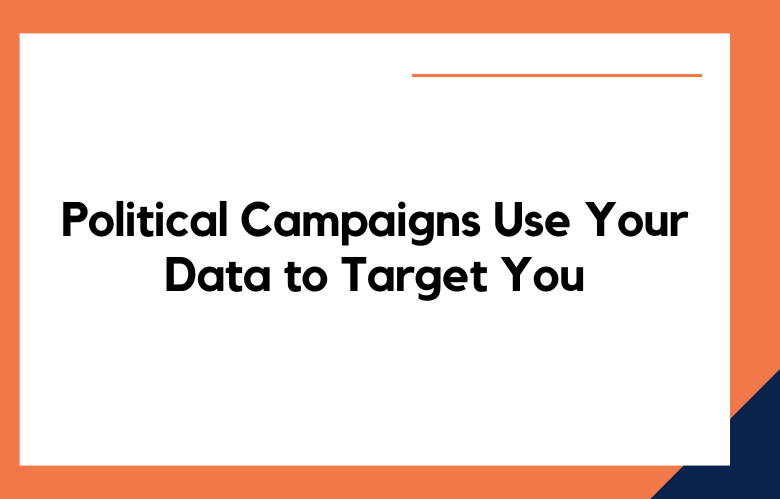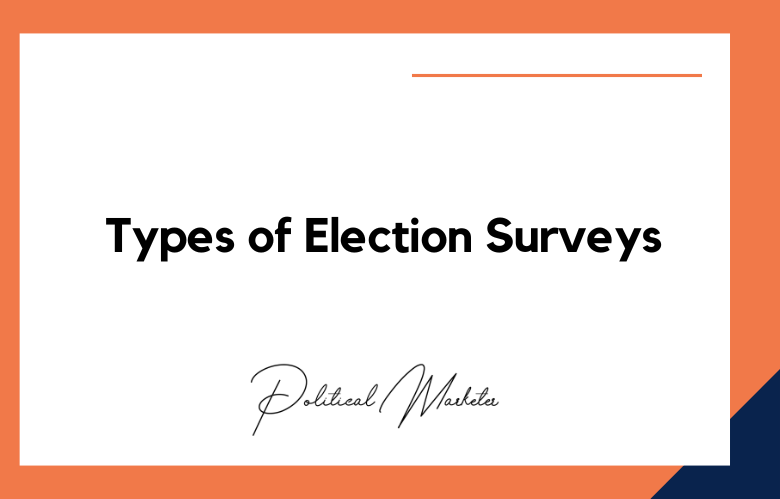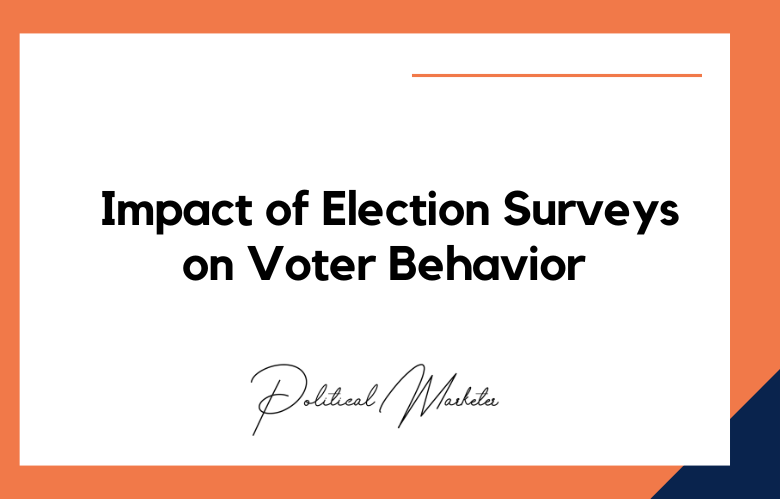In today’s digital age, political campaigns harness the power of big data and sophisticated algorithms to tailor their strategies and target potential voters with unprecedented precision.
The use of personal data in political advertising has transformed electoral strategy, leveraging a wide array of information to influence voter behavior. This approach is about reaching more people and reaching the right people with messages that resonate personally.
How Political Campaigns Use Your Data to Target You
This guide delves into how political campaigns collect, analyze, and utilize your data to deliver targeted advertisements across various platforms. From basic demographic details to more nuanced data like browsing history, purchase behaviors, and even social interactions, campaigns compile comprehensive profiles of individuals. These profiles help craft personalized messages that might appeal to your fears, hopes, and values.
Understanding how your data becomes a tool in political campaigns is crucial for every social media user. It raises important questions about privacy, consent, and the ethical boundaries of digital marketing. The process often involves the direct collection of data by the campaigns themselves and third-party data brokers who aggregate and sell personal information.
Moreover, this guide will explore the implications of such data use in political contexts, including how it affects democratic engagement and public trust in electoral processes. As digital platforms become increasingly entwined with daily life, navigating this new reality is essential for the informed citizen. By shedding light on these practices, the guide aims to empower readers with the knowledge to understand and possibly counteract the targeted political advertising they encounter online.
The Evolution of Data Targeting in Political Campaigns: Insights
The intersection of data science and political campaigning marks a pivotal evolution in how electoral strategies are crafted and executed. This transformation has been driven by technological advancements and data analysis, enabling political campaigns to target voters with unprecedented specificity and effectiveness. “The Evolution of Data Targeting in Political Campaigns: Insights” explores how this paradigm shift has redefined political engagement and voter influence in the modern era.
From the rudimentary use of demographic data in early campaigns to the sophisticated algorithm-driven approaches of today, this guide traces the journey of data targeting in politics. It examines the role of big data, the internet, and social media analytics in shaping political messages that resonate with individual voters on a personal level. As campaigns become more adept at sifting through vast amounts of data to pinpoint voter preferences, concerns, and likelihood of turnout, the implications for democracy and privacy are profound.
This introduction sets the stage for a deeper understanding of the mechanics and the consequences of modern data-driven campaigning. It discusses the tools and techniques at the forefront of this change, including behavioral microtargeting, psychographic profiling, and real-time campaign adjustment based on data analytics. Additionally, it considers the ethical considerations and regulatory challenges that arise as political entities harness the power of personal data to sway electoral outcomes.
Unveiling the Tactics: How Your Data Shapes Political Campaigns
In the digital age, political campaigns have transformed into highly sophisticated data-driven operations that meticulously analyze and utilize personal data to influence voters. This strategic use of data shapes campaign strategies and significantly impacts the democratic process. Understanding the mechanisms behind this data utilization can empower voters and prompt more informed discussions about privacy and electoral integrity.
The Role of Data in Modern Political Campaigns
Data Collection: Political campaigns gather data from various sources, including voter registration files, social media, public records, and even purchase histories. This information helps campaigns understand voter preferences, concerns, and behaviors.
Microtargeting: By analyzing collected data, campaigns can segment the electorate into small groups or individuals with similar interests or behaviors. This allows for microtargeting, where tailored messages are designed to resonate deeply with specific groups, enhancing engagement and support.
Behavioral Prediction: Advanced algorithms and predictive models use this data to forecast individual voter behavior, such as their likelihood to vote, support a candidate, or respond to particular issues. This predictive power enables campaigns to focus resources more efficiently.
Adaptation and Real-Time Response: Campaigns continuously update their strategies based on incoming data about the effectiveness of their messages and changing voter sentiments. This real-time adaptability allows campaigns to remain agile, shifting focus to address emerging trends or counter opponents’ strategies.
Psychographic Profiling: Beyond demographics, campaigns increasingly use psychographic profiling to understand the psychological attributes of voters, including values, fears, and motivations. This insight leads to even more precisely crafted messages that can sway voter opinions or mobilize turnout.
Implications for Voters and Democracy
The extensive use of data in politics raises critical questions about privacy and the manipulation of voter behavior. While targeted campaigning can enhance engagement by providing voters with relevant information, it also poses risks of misinformation, voter manipulation, and a lack of privacy. The detailed understanding that campaigns develop about individuals’ private lives and preferences can lead to ethical dilemmas and potential abuse.
As political campaigns evolve into more data-intensive operations, voters need to be aware of how their data is used and its influence on the political landscape. Advocating for stringent data protection laws and ethical standards in political advertising is crucial to ensuring that the digital revolution in political campaigning benefits democracy without undermining the privacy and autonomy of the electorate.
Decoding Data Privacy: What Political Campaigns Know About You
“Decoding Data Privacy: What Political Campaigns Know About You” is an essential guide for anyone concerned about how much personal information is accessible to political campaigns and how this data influences voter behavior. In an era where data privacy issues are more prominent than ever, understanding the scope and depth of data collected by political entities can be both eye-opening and disturbing.
This guide delves into political campaigns’ sophisticated data-gathering techniques to craft highly targeted strategies. It covers how campaigns collect data, ranging from basic voter registration information to more detailed data points such as consumer behavior, online browsing habits, and social media activity. By amalgamating this information, political operatives create detailed profiles of voters, allowing them to send customized messages that resonate on a personal level.
The Impact of Data Analytics on Political Campaign Strategies
The impact of data analytics on political campaign strategies has been profound. It has reshaped how campaigns are run, from voter outreach to message optimization and beyond. This evolution reflects a shift from traditional campaigning methods to data-driven approaches that leverage big data to gain strategic advantages.
Understanding the Voter Base
Data analytics enables campaigns to collect and analyze vast information about potential voters, including demographic data, voting histories, online behaviors, and consumer habits. By synthesizing this data, campaigns can identify key voter segments and tailor their strategies to effectively target these groups. This targeted approach helps maximize the impact of campaign messages and increase voter engagement.
Tailoring Messages
One of the most significant advantages of data analytics is the ability to personalize communication. Political campaigns use data insights to craft messages that resonate with individual voters or specific demographic groups. This can involve highlighting particular issues, adjusting the tone of communications, or choosing the right time and medium for message delivery. Such customization increases the relevance of the messages, making them more compelling to the recipient.
Resource Allocation
With insights from data analytics, campaigns can allocate their resources more efficiently. By understanding which areas are most likely to swing in their favor or where voter turnout could be maximized, campaigns can focus their canvassing efforts; ad spends, and workforce where it counts the most. This strategic deployment of resources can be the difference between winning and losing in tightly contested areas.
Predictive Modeling
Campaigns use predictive modeling to forecast voter behavior and election outcomes. These models can predict voter turnout, the effectiveness of specific messages, and even the impact of external factors on voter sentiment. With this knowledge, campaigns can adapt their strategies in real-time, responding swiftly and more effectively to shifting dynamics.
Feedback and Adaptation
Real-time data analytics provides campaigns with immediate feedback on the effectiveness of their strategies. This allows for rapid adjustments in messaging, medium choice, or target demographics. In a rapidly changing political environment, the ability to pivot quickly based on data-driven insights can provide a critical competitive edge.
Ethical Considerations
While data analytics offers numerous benefits, it also raises ethical concerns. The extensive collection and analysis of personal data can lead to privacy violations and potential manipulation of voters through hyper-targeted and potentially misleading messages. Therefore, transparency about data collection methods, adherence to privacy laws, and ethical use of data are paramount to maintaining trust and integrity within the electoral process.
Personalized Politics: How Data Influences Campaign Messaging
“Personalized Politics: How Data Influences Campaign Messaging” is an insightful exploration into the sophisticated use of personal data by political campaigns to tailor their messaging to individual voters. As we delve deeper into the digital age, the intersection of data analytics and political strategy has become increasingly intricate, highlighting how crucial personal information is in shaping political communication.
Introduction to Personalized Politics
In this book, we explore the transformation of political campaigning in the digital era, where data is not just a resource but a cornerstone of strategy. Political campaigns have turned to advanced data analytics to dissect voter behavior, preferences, and sentiments, enabling them to customize their messages with unprecedented precision.
The scope of data collection is vast, from collecting data points through social media interactions, website visits, and mobile app usage to employing sophisticated algorithms that predict voter behavior. This book aims to demystify the processes behind data-driven campaign strategies and their implications for democracy and individual privacy.
By understanding how campaigns use personal information to craft persuasive messages, voters can better navigate the modern political landscape, recognize the influence of targeted messaging, and make more informed choices at the polls. This exploration is not just about critiquing the status quo but also about empowering readers with the knowledge to understand and engage with the political process in a more meaningful way.
Conclusion:
Political campaigns leverage user data to target voters with unprecedented precision, tailoring messages that resonate on a personal level. Data analytics involves collecting information about individuals’ online behavior, demographics, and offline activities to create detailed profiles. As a result, campaigns can send particular messages through social media, email, and other platforms, aiming to influence voting behavior or increase engagement with specific issues.
This raises significant privacy concerns and calls for more transparent data usage practices. To safeguard their information, individuals should proactively manage their digital footprints, adjust privacy settings on social media, and be critical of the data they share online. In this digital age, becoming more informed about data privacy and the mechanisms behind political advertising is essential for all internet users.
Call: +91 9848321284
Email: [email protected]










